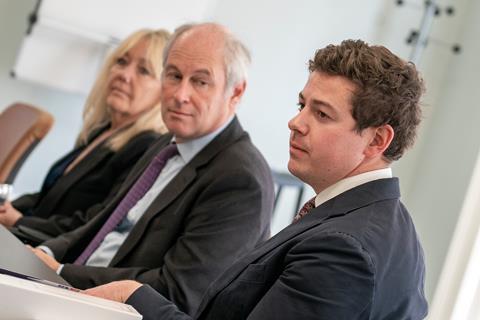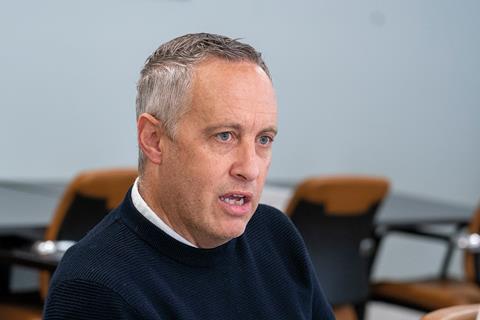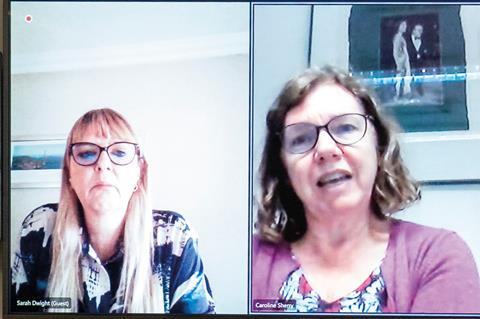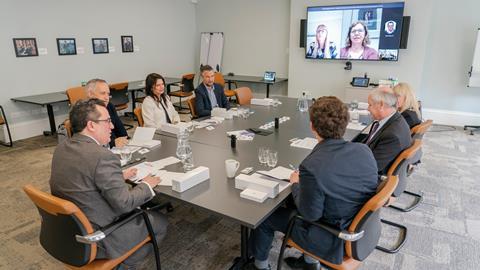For residential conveyancers, commoditisation and unrealistic demands on their time amid a staffing crisis are high on a list of challenges. But, as Eduardo Reyes reports from the latest Gazette roundtable, there are signs that the downward pressure on fees is easing
At the table
(Clockwise from left)
Eduardo Reyes, Law Society Gazette
Andy Roscoe, Meaby & Co
Sakhjit Randhawa, Keystone Law
Owen Davies, DWSN
Sarah Dwight, Sarah Dwight Solicitor (on screen)
Caroline Sherry, Glazer Delmar (on screen)
Sarah Conway, Maurice Turnor Gardner
Robert Barham, Forsters
Hugh Wigzell, Farrer & Co.
The residential property market has long been capable of generating its own dramas, especially in sought-after areas of London and the south-east. With housing in short supply, even a distinctly ropy economy seems unable to provide a sustained correction to sky-high property prices.
That has not been the good news for residential conveyancers outsiders might assume. Pent-up demand after the first Covid‑19 lockdown and stamp duty holidays turbocharged the housing market. Solicitors were confronted by long hours and pressure from clients, aggravated by a shortage of lawyers who can carry out the work. Digitisation of parts of the process happened almost overnight, and rising interest rates and political instability have added to the complications for transactions.
Market conditions
The group of solicitors in attendance today ranges from sole practitioners and high street practices to West End and Mayfair firms handling transactions in prime central London. The discussion begins with each relating their current experience of the property market.
Speaking days after the Truss-led government’s disastrous 23 September mini-budget, Birmingham sole practitioner Sarah Dwight’s impression is completed by the current experience of her husband, a mortgage broker. ‘He is busier than he has ever been trying to secure mortgages for people,’ she says. ‘But interest rates are going up dramatically and lenders are pulling offers.’

Dwight says she is spending a lot of time on phone calls to buyers, sellers and lenders: ‘There’s a real hand-holding job going on… We’ve all been extremely busy and overworked and stressed during the pandemic and the stamp duty holiday. And now we’ve got something else thrown at us.
‘We still have to be sympathetic to our clients and try to guide them through it, while appreciating that we’re all under extreme pressure ourselves and we don’t know what the answers are, and we don’t know which way it’s going to go.’
Market uncertainty and its impact on clients ‘filter through for everyone’, adds Robert Barham, a partner at Mayfair firm Forsters. ‘It’s very much an emotional thing, isn’t it? It’s a bit like divorce and conveyancing are the two things that people do in their lives and you are there to keep them calm.’
'We cannot find anybody that we’d want to employ, so we’re just left with the solicitors we’ve got sinking under piles of instructions'
Caroline Sherry, Glazer Delmar
In all parts of the market, there is a shortage of conveyancing solicitors and paralegals.
Andy Roscoe, from south London firm Meaby & Co, explains: ‘We’ve been trying to recruit additional residential conveyancers. Not just anybody – we want the right fit, the right experience, and someone we can trust, especially with hybrid working. We can’t find those people, they’re not there.
‘I’ve read that 40% of residential conveyancers left the profession over the last couple of years,’ he adds. ‘So even if the market drops, the mortgage brokers will find they’re less busy, but will the conveyancers?’

‘We’re in the position that we’re actually having to turn down work,’ says Caroline Sherry of Glazer Delmar, another south London firm. ‘We cannot find anybody that we’d want to employ, so we’re just left with the solicitors we’ve got sinking under piles of instructions. That’s why we’ve taken the decision to say “no”, except to returning clients and specific estate agents.’
‘The last two years for everyone on the high street, has been absolutely brutal,’ Sarah Conway, a partner at Maurice Turnor Gardner, confirms. ‘I absolutely echo that trying to find really good staff is impossible.’
The UK’s economic woes have also fed demand from foreign buyers who, thanks to the weak pound, see opportunities for bargains. As a result, Keystone Law partner Sakhjit Randhawa says: ‘It’s absolutely crazy at the moment.’
Hugh Wigzell, a solicitor at London firm Farrer & Co, confirms the state of the UK’s economy has ‘given huge buying power to anyone pegged to the [US] dollar, and that drives demand at the top of the market’.
Owen Davies, chair of DWSN, the sponsor of the roundtable, draws on the search business’s involvement in transactions across the market nationwide to give an overview.
After a ‘crazy’ period for property transactions, he says, ‘we’ve returned to seasonality, which we haven’t had for two years’. That meant a dip in May and over the summer holiday period, picking up in September. But, he adds: ‘The cost-of-living squeeze has got to slow the market down at some point, but it’s just not happening. And you’ve got that supply and demand issue keeping prices high… there are still not enough houses in the market… so that’s maintaining prices.’
Risky business
The risks of fraud and professional negligence claims are ‘always something you have to keep at the forefront of your mind’, says Farrer & Co’s Hugh Wigzell.
These risks are reflected in the professional indemnity insurance premiums that conveyancing practices attract. ‘Premiums are going through the roof because they’re going to be expecting huge claims,’ says Sarah Conway from Maurice Turnor Gardner.
The expectation is that the pressures on transactions in the ‘white-hot’ property market seen after the first Covid lockdown in 2020 will lead to alleged errors and claims.
Insurers, Conway says, ‘do ask all the right questions’, requiring from firms a list of transactions, and information on which matters are from repeat clients, and the proportion of new-build transactions a firm does. (Some new-build development types are deemed higher risk, having attracted more claims in the past.)
The process of ‘know your client’ checks (KYC) has become easier, attendees agree, preventing both fraud and time-wasting ‘fantasist clients’. The combination of checks now available, and the ability to combine them with client interviews (including via video link) and virtual and online site visits, is also deemed helpful. Most say conveyancing practices in general are wiser to ‘Friday afternoon frauds’ than in the past.
There is work to be done though. Forsters’ Robert Barham wants HM Land Registry to put ‘in place a system that would make it more difficult for fraudsters’, instead of leaving practitioners to rely on information from the police about repeat offenders and gangs attempting to launder money through property.

Computer says no
Digitisation in residential conveyancing covers several important areas. There are digital signatures and identity verification, but also the use of online portals by HM Land Registry and lenders.
There is a mixed response to digital signatures around the table.
‘Electronic signatures are quite a blessing,’ says Wigzell. ‘Once you get the knack of it, it helps a lot to get deeds signed on a day, particularly with an international client base [and] not having to courier something out.’
Roscoe reports problems not with the reliability of electronic signatures as and of themselves, but with their adoption by other firms.
‘I think there’s probably a lack of education among solicitors about how secure electronic signatures actually are,’ he says.
‘I’m a Luddite,’ Sherry comments. ‘I’m still getting my clients to sign with wet ink because I haven’t got the time to work out how else to do it. Hopefully, things will calm down and I’ll be able to get my head around it.’
‘There could be a better tie-up between the Land Registry and the [lender] portals,’ Sherry continues. She relates the example of lenders asking for confirmation that applications to the Registry have been asked for long after the fact because applications had not been processed.
‘That puts unnecessary pressure on conveyancers to keep lenders updated,’ she says. ‘There must be some way that they could liaise with the registry [so lenders can] just look at the “day list” to see that the application has been submitted and is waiting to be processed.
‘I think that there is room for digitisation of that part of the process, which [would] take the pressure off conveyancers at the end of the transaction,’ she adds.
Sherry notes there are specific backlogs at the Registry, especially for new builds and lease extensions.
In terms of the service from lenders, digitisation has gone hand in hand with growing difficulties in accessing relevant bank staff. Conway infers from the telephone ‘hold’ music that one major lender has solicitors and members of the public held in the same interminable telephone queue. This adds lengthy delays to basic enquiries.
Some are better, Conway says: ‘At Coutts you can speak to someone every day, and you immediately have [the client’s] private banker to speak to.’ As a result, action on such mortgage offers is quick at this private bank.

Fees and pricing
The sustained downward pressure on conveyancing fees has been a headache for solicitors for years. The role, service and experience of solicitors have been consistently underappreciated.
Dwight describes the approach of acting for some clients for the first time. ‘One of their questions is, “Is it no sale, no fee?”,’ she says. ‘I know that there are firms that offer that, but I’m surprised that clients would expect us to do all of the work for nothing.’
But has there been an easing of that pressure? Barham says he has ‘the impression that [fees are] going up’.
‘I think people are being more realistic, and maybe it’s a product of capacity and recruitment problems,’ he says. ‘We would certainly rather do fewer, better quality jobs… conveyancing is not a simple job. It’s got more and more complicated in my career of 30 years. Every year, there’s something else that you have to think about… and we haven’t kept up on fees.’
'There’s been a race to the bottom, particularly at the lower end of the conveyancing market – the below-£1 million properties – and it’s been led by a lot of the factory conveyancing firms'
Andy Roscoe, Meaby & Co
Solicitors now publish fees on their website as part of price transparency requirements. Conway says her firm’s minimum fee was increased at the end of the summer.
‘I’m trying to be far more realistic about the fee that we charge now,’ she says. ‘But it’s competitive and they’ll go elsewhere, and you don’t want to have nothing to do and price yourself out the market.’

‘If price is the client’s only factor, then I do think that’s not the client I want,’ Roscoe responds. ‘I want the client to have chosen me because they’ve had a recommendation or they’ve done their research.
‘There’s been a race to the bottom, particularly at the lower end of the conveyancing market – the below-£1 million properties, the non-prime central London properties – and it’s been led by a lot of the factory conveyancing firms with their referral arrangements with the estate agents.’
Sherry says her firm has increased its minimum price.
‘We do find people who want “no sale, no fee”,’ she adds, ‘and we tell them to go elsewhere because that’s not how we work.’
‘It’s just a cultural thing now, isn’t it, because we’re so used to shopping around for the lowest prices on the internet,’ Davies observes. ‘That’s what changed everything. You don’t have to make phone calls, even – you can look on websites. People do it naturally now.’
Conduct of business
The online world has changed behaviour in other ways too. The latest emphasis is on speed, rather than care and attention to detail.
‘I think clients’ behaviours, agents’ behaviour, even some lawyers’ behaviour, over the last 18 months to two years has been… very disrespectful,’ Conway relates. ‘It’s all about how fast you can do everything. It’s speed, speed, speed… the behaviour I have found, of clients particularly, [has been] unbelievable… the respect seems to have gone.’
This may be one factor, Dwight suggests, ‘that contributes to people leaving the profession and not wanting to do it as a career’.
‘It’s interesting isn’t it,’ Roscoe says, ‘that we’re in a situation where it feels to me like some people are going to be driven from this part of the profession by the fact that there’s a boom on... the pressures that come with that [whereas] it should be good times for everyone here.’

Despite the challenges identified by this roundtable’s attendees, they have committed their careers to conveyancing. So how would they pitch working in residential property to attract and retain good lawyers?
Roscoe identifies ‘the turnover of clients’ as a positive feature. ‘You’re constantly meeting and seeing different people,’ he says. ‘You deal with an awful lot of other solicitors, an awful lot of clients… I think if you’re a people person, as I tend to be, that’s good. I like the variation and variety in the job, and I think that’s the big selling point to me.’
‘It’s a personal sort of area of law,’ says Randhawa. ‘Dealing with people is a great thing. I never expected to get into residential property when I was at law school or even university.’
‘I am actually very passionate about conveyancing,’ Dwight says. ‘It makes me really sad the way I see it going, with nobody wanting to take up the gauntlet and take over from we very experienced conveyancers.’
So what are junior lawyers who eschew conveyancing missing?
‘You come to work thinking something is going to happen and there’s a curveball and it’s something completely different, and I just think that it is a fascinating area of law,’ Dwight adds.
As Sherry concludes: ‘It’s a very satisfying area of law because you’re helping people with what is, in 95% of cases, a very positive step in their lives. They want to be buying a house, they want to be selling… they’re not getting divorced and they haven’t committed a crime. It’s a positive.’
- This roundtable was sponsored by the Drainage & Water Searches Network (DWSN) to mark the launch of the DWSN quality mark on 3 October 2022 and the 20th Anniversary of the CON29DW Residential.
Photographs by Noah Da Costa





































1 Reader's comment